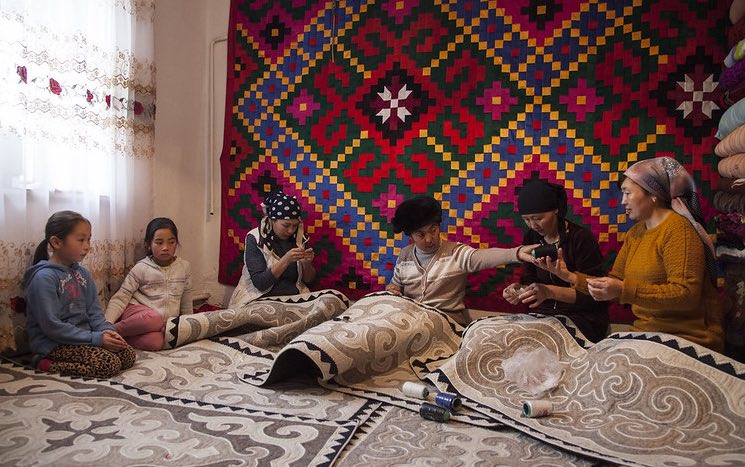Do ambitious women tend to be more empowered in their households? Our recent study, published in Economics of Transition and Institutional Change (with co-authors Kamiljon Akramov, Bakhrom Mirkasimov, Jie Song, and Hongdi Zhao) suggests that the answer is yes—women with higher aspirations tend to be more involved in intra-household decision-making, and they and their spouses are also more likely to provide non-conflicting reports about what decisions each spouse influences. They are also more likely to marry partners with supportive attitudes towards gender equality and high aspirations.
Focusing on Kyrgyzstan, our study posits that raising women’s aspirations may lead them to demand decision-making authority in the household and to choose husbands who support this demand. The results have potentially promising policy implications. The research was motivated by growing interest in development interventions aimed at reducing behavioral poverty traps, including raising women’s and girls’ aspirations, or future-oriented goals.
Existing literature shows that high-aspiring individuals tend to be forward-looking and entrepreneurial; they are more likely to save, take up new technologies with potentially large payoffs, operate a small business, and invest in their children’s education. They are even more likely to express discontent with government in response to the persistence of poverty—critical for promoting government accountability.
We use data from two rounds (2013 and 2016) of the Life in Kyrgyzstan Study’s nationally representative panel survey to assess how well a woman’s aspirations predict her gender attitudes, the kind of marriage she enters, and her involvement in household decision-making.
How does one define and measure aspirations? Following existing literature, we think of aspirations as the goals and aims an individual harbors—which do not change quickly over time. We construct a single index capturing individual-level aspirations in five dimensions: Household income, household wealth, average education of family members, personal security, and personal social status. We show that this measure is distinct from expectations—about which we also gather data.
Our outcomes comprise several measures related to women’s empowerment. First, we consider measures of the extent to which a woman’s gender attitudes are egalitarian (i.e., reflect belief in the equality of women and men). Next, we turn to decision-making. Decisions may be made by women alone, by men alone, or jointly. To this end, we code indicators using insights from Ambler et al. (2017) for there being consensus in the household that women are involved in each of several decisions about household management. We also construct analogous indicator for consensus that men are involved in each decision. Finally, following Annan et al. (2021), we code several indicator variables for each of various decisions: 1) a wife claims to have more of a role in decision-making than her husband credits her with having; 2) the husband claims his wife has more of a role in decision-making than she acknowledges having; 3) both give the same response; and 4) there is consensus that the wife is not involved in decision-making.
Our results suggest that in a low-income country context, a woman having higher aspirations predicts an increase in the extent to which she espouses egalitarian gender attitudes. However, aspirations do not have the same relationship with all gender attitudes. Having greater ambition does predict a woman will support women becoming educated, building a career, earning income, and making decisions in the home. But it does not predict her views on the proper roles of women in the home and society. For example, aspirations are uncorrelated with a woman’s beliefs that being a housewife and mother are fulfilling jobs, that religion proscribes women working, or that working mothers can still share a strong bond with their child. It is possible that norms in this domain are stickier and less malleable, and thus less likely to respond to interventions aimed at raising women’s aspirations.
Higher aspirations also predict movement towards decision-making between spouses that is mutually recognized as involving women. Aspirations predict significantly higher rates of husbands and wives giving the same response about who makes decisions (measure (3), above), and fewer cases of the other measures—husbands giving power, wives taking power, or a consensus that the wife does not influence decisions.
Why it matters
Changing traditional gender norms and building gender equity are major policy challenges. Our results offer some promise in this area, showing that development interventions aimed at raising the aspirations of girls and women may be promising for eventually empowering those women. They may help change traditional norms, ensure that women select more egalitarian husbands, and open opportunities for women to exert influence over decisions within their households after marriage. Attention to context is critical in determining where aspirations are a binding constraint on women’s empowerment.
What’s next?
While our study provides some interesting results, it also has limitations. First, our approach relies on ordinary least squares (OLS) estimation. While the coefficient estimates on aspirations are generally stable following the inclusion of a variety of different vectors of observables, we cannot rule out the possibility of unobservable characteristics affecting our results. We used several robustness checks and the results provided seemed encouraging; however, caution is warranted in interpreting these estimates as causal, and future work exploiting exogenous variation in aspirations is needed.
Katrina Kosec is a Senior Research Fellow with IFPRI’s Development Strategy and Governance Division (DSGD); Lucia Carrillo is a DSGD Research Analyst.
This research was supported by the IFPRI-led CGIAR Research Program on Policies, Institutions, and Markets (PIM) and the Ministry of Finance of the Russian Federation under IFPRI’s Collaborative Research and Capacity Strengthening Program for Enhancing Agricultural Productivity and Food and Nutrition Security in Central Asia.







